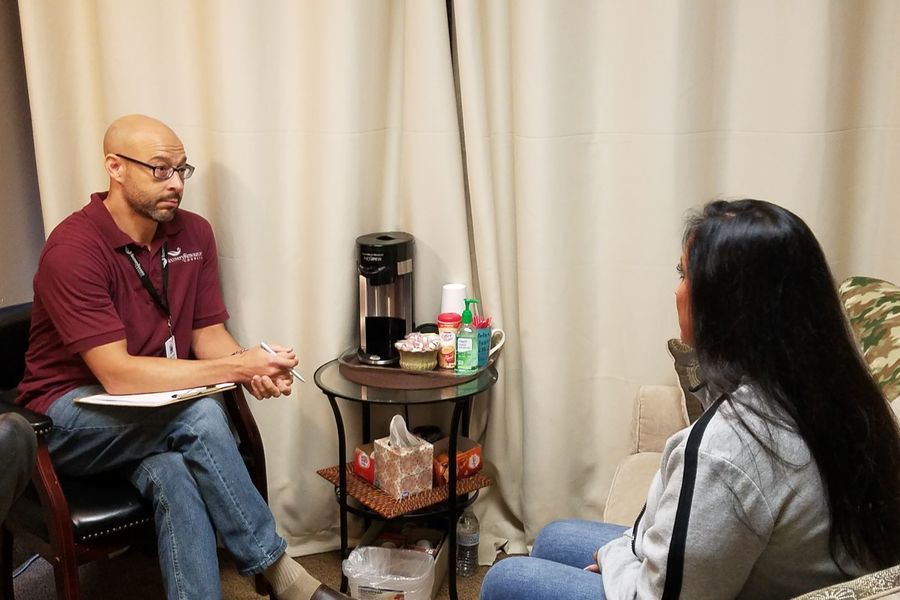Veteran Therapy Incentives

Locations
- Recovery Resource Council, Texas
Focus Area
- Health
“We know that if a veteran attends therapy, their anxiety and depression lessen, and their quality of life improves. But many veterans struggle to attend counseling sessions, often dropping out before they can make progress towards healing. We are testing an intervention we believe will increase attendance rates, and help veterans move forward towards other goals like job retention, financial stability, and better health.”
The Issue
Since 9/11, a steady stream of more than 2 million U.S. military service members has been deployed to combat zones in Afghanistan and Iraq. It is hard to imagine the anxiety, stress, and loneliness a service member may feel while deployed—whether for the first time, or as a seasoned soldier with several deployments already under his or her belt. Being away from family and other social supports while maintaining a constant state of hyper-awareness due to the inherent danger of a war zone can take a severe mental toll. And it does. Of those who were assigned to units that saw combat during deployment, 13% came away with some degree of post-traumatic stress disorder (PTSD).
Though the military has made great strides in helping service members identify PTSD symptoms, particularly after a deployment, the rate of veterans entering treatment and continuing with therapy is low. Recent studies of PTSD treatment programs by Hoge, Mott, and Watts have found that many veterans who enter treatment do not stay for the intended duration, which can impact the clinical benefits the veteran may have hoped to see.
Most notably, veterans who never sought treatment or who discontinued treatment prematurely have cited a variety of barriers keeping them from carrying out their full course of sessions. One of these barriers is a lack of time. Veterans who are working, raising a family, and engaged in other community commitments may feel that their plate is already full. And adding in regular counseling sessions to confront past trauma is not only time-consuming. It can be mentally and physically exhausting, too—leaving little energy for engaging in the new demands of civilian life.
But there is a promising way forward. While most research has centered around identifying why veterans prematurely discontinue treatment or do not seek it at all, other studies in the field of health point to a possible way to keep veterans engaged with their therapy. These studies involve the use of financial incentives to help promote positive health habit formations in individuals. Though these studies have primarily focused on such things as smoking cessation, exercise, and workplace wellness, they have shown positive relationships between incentives and desired health change.
Incorporating a financial incentive into treatment may be what it takes to help veterans overcome barriers—compensating them for time away from work to attend counseling sessions or helping to ease other life stressors and free up time and energy for staying engaged with therapy and moving towards healing.
The Intervention
The Enduring Families program at the Recovery Resource Council (RRC) provides free outpatient counseling services for military veterans in the North Texas community. RRC provides individual psychotherapy sessions to help veterans work through the unique mental health challenges they face as a result of their service, such as PTSD, severe depression, and Traumatic Brain Injury. Though the number of counseling sessions vary according to the needs of individual veterans, most are prescribed between six and 18 sessions.
Research Question
Does providing a monetary incentive to veterans participating in counseling have an impact on the number of sessions they attend and the completion of their prescribed therapy?
Intended Outcomes
- Researchers will learn if providing a monetary incentive to veterans for attending counseling sessions increases the number of sessions attended and the completion rate of prescribed therapy.
- This study will also consider the cost-effectiveness of the incentives. If evidence shows that veterans do attend more prescribed counseling sessions and complete counseling at a higher rate when offered a monetary inventive, RRC could confidently deliver incentives to more veterans.
Research Study Design
The evaluation of RRC’s monetary incentives is a randomized controlled trial. Anyone who holds veteran status, is 18 years or older, and voluntarily agrees to participate in the study will be eligible.
Anyone who contacts RRC for mental health therapy is screened for eligibility, including veteran status. Those who are eligible are scheduled for an initial intake session, where they are randomly assigned to the study’s treatment or control group.
Veterans who are assigned to the treatment group are informed that they will receive $500 for attending their first six counseling sessions, and another $500 for attending six more sessions if they are prescribed. Veterans in the control group will receive the same counseling services, without a monetary incentive to continue the sessions.
At the conclusion of the study, LEO researchers will compare the outcomes of veterans across both groups. In this way, LEO can isolate the effect of incentives on the outcomes of interest.